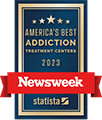Understanding PTSD
Learn About PTSD
Posttraumatic stress disorder (PTSD) is a mental health condition that is defined by the development of upsetting symptoms after a traumatic event has occurred. The types of trauma that an individual might experience that can cause PTSD can include physical assault, sudden catastrophic medical events, natural disasters, severe automobile accidents, sexual violence, and military combat, to name a few. PTSD can be brought on by either directly experiencing these events or seeing them happen to someone else.
Those who have PTSD might have recurrent distressing memories of the traumatic event or events, trauma-related nightmares, and dissociative reactions (known as flashbacks) where they feel like they are going through the traumatic event once again. As a result of these and other reactions, those with PTSD might change their behaviors to avoid people, places, or things that trigger memories of the traumatic event(s) that they experienced. They might also notice changes in attitude, mood, and perception.
When an individual who is already battling a substance use disorder develops PTSD, his or her experience can become more complex. One common way in which individuals with PTSD try to decrease the impact of their memories is to abuse drugs and/or alcohol. When an individual in this situation has already developed a substance use disorder, he or she can grow reliant on his or her substance or substances of choice. While getting high or becoming intoxicated can seemingly help reduce the pain connected to these memories, the abuse of any substance can aggravate symptoms and make efforts to defeat a substance use disorder and co-occurring PTSD much more challenging.
Those who are struggling with a substance use disorder and co-occurring PTSD require the treatment provided by professionals. With the appropriate care, these individuals can obtain symptom relief, work through their issues surrounding their disorders, and obtain healthy skills for coping that will keep them steadfast in recovery.
Statistics
Statistics of PTSD
Roughly 3.5% of Americans will develop PTSD within a 12-month period, and the lifetime prevalence of this disorder is 8.7%. The chances of developing PTSD are much higher amongst women than men. The National Center for PTSD states that 10% of women in comparison to 4% of men will develop this disorder at some point in their lives. Experts approximate that between 20% and 43% of adults with PTSD also struggle with substance use disorders, compared to a rate of substance abuse between 8% and 25% within the general public. The substance abuse rate amongst veterans is 75%.
Causes & Risk Factors
Causes & Risk Factors of PTSD
The one aspect that is necessary for PTSD to occur is one or more traumatic events. However, a number of other factors can impact whether or not an individual’s response to one of these events will cause them to develop PTSD:
Genetic: Research shows that specific genotypes can increase or decrease the chances of an individual who has been exposed to trauma to develop PTSD.
Environmental: Before a traumatic event occurs, one’s environmental influences like poverty, lower educational progress, childhood adversity, and family history of mental health conditions can impact a vulnerability to developing PTSD. During and after a traumatic event, aspects such as the severity of the experience, exposures to reminders of the event, other upsetting life events, and the lack of a strong support system can add to one’s chances of developing this disorder.
Risk Factors:
- Prior mental health issues
- Being younger at the time of the traumatic event or events
- Poor coping skills
- Being female
- Lower intelligence
- Lower education level
- Being a member of a minority racial or ethnic group
- Experiencing interpersonal violence
- Low socioeconomic status
- Insufficient social support
Signs & Symptoms
Signs & Symptoms of PTSD
Post-traumatic stress disorder might be exhibited through a variety of different symptoms, depending on a number of aspects. Some of the most common symptoms of this disorder include:
Behavioral symptoms:
- Withdrawing from family or friends
- Diminished participation in important activities
- Avoiding certain events, situations, or people
- Reckless or otherwise self-destructive behaviors
- Fighting, destruction of property, and other acts of violence
- Engaging in substance abuse
Physical symptoms:
- Exaggerated startle response
- Hyperarousal
- Sleep disturbances
Cognitive symptoms:
- Memory problems
- Difficulty concentrating
- Depersonalization
- Derealization
- Vivid and disturbing nightmares
- Recurrent distressing memories
Psychosocial symptoms:
- Persistent negative mood
- Angry outbursts
- Hypervigilance
Co-Occurring Disorders
PTSD & Co-Occurring Disorders
Those who go through PTSD are at a higher risk for developing symptoms that meet the criteria needed to be diagnosed with an additional mental health disorder. The following are some of the co-occurring disorders that often co-exist with PTSD:
- Bipolar disorders
- Anxiety disorders
- Major neurocognitive disorder
- Substance use disorders
- Depressive disorders
Effects of PTSD
Effects of PTSD
Allowing PTSD to go untreated can lead to serious negative effects on all areas of an individual’s life. Below are some of the most common effects that have been linked to PTSD:
- Suicidal ideation
- Suicide attempts
- Substance abuse and addiction
- Injury to self or others due to violence or recklessness
- Development of additional mental health disorders
- Homelessness
- Inability to establish or maintain interpersonal relationships
- Family discord
- Diminished performance at work
- Job loss and unemployment







